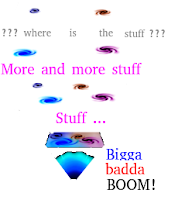This series began over a decade ago (Rebel Science: The Dark Matter of Faith) and was extended under Heretics Deny The Dark Matter of Faith, 2, 3.
The gist of the theme in this series is that 'knowledge' can be or become 'faith' or 'belief' if we are not careful (The Pillars of Knowledge: Faith and Trust?).
The scientific 'knowledge' involved is or has been controversial rather than being a consensus, but less so since, as time goes on, the universities promote dark matter cognition over others (see Fig. 1 link).
 |
| Fig. 2 Where Da Stuff At? |
There are still 'diehards' on both sides of the issue (Heretics Deny The Dark Matter of Faith - 3, cf. "astrophysicist Henri Reboul discovered that over thirty categories of redshift theories have been proposed over the years in over 200 papers" at Redshift Types).
II. Remodeling of The Hypotheses
The origin of red shift thinking associated with the Hubble Constant had its problems (Sorry, Astronomy Fans, The Hubble Constant Isn't A Constant At All, cf. Hubble's law).
That and other issues led to projects that remodeled the hypotheses (e.g. Georges Lemaître, George Gamow).
When all that did not clear it up for everyone, along came the Dark Matter hypothesis, which, as pointed out in previous posts linked to above in Section I, has its own problematic metamorphosis.
III. Some Elementary Considerations
In today's Appendix, I present three HTML tables that, in my opinion, show the difficulty in believing or trusting completely that the Big Bang hypothesis is straight-forward.
The 'thought experiment' in the appendix contains three tables showing that gravity ('the weak force') takes too long of a time to bring things together within the current ~13.8 billion year old Big Bang time frame.
One table shows the length of time it would take to bring our Sun and various single stars into contact, another table shows the length of time it would take to bring various dust clouds at various distances and sizes together to form more dense orbs, while the final table shows how long it would take for gravity to move hydrogen atoms into contact with each other over the distance of a nano-meter.
IV. More Detailed Considerations
Several Dredd Blog series detail the even more difficult explanations required in order to reconcile the various dark matter hypotheses (The Uncertain Gene, 2, 3, 4, 5, 6, 7, 8, 9, 10, 11; Putting A Face On Machine Mutation, 2, 3, 4; The Machine Religion, 2, 3; The New Paradigm: The Physical Universe Is Mostly Machine; Did Abiotic Intelligence Precede Biotic Intelligence?; On the Origin of the Genes of Viruses, 2, 3, 4, 5, 6, 7, 8, 9, 10, 11, 12, 13, 14, 15, 16).
Those posts detail the incredible dynamics involved in the utterly complex situations required in the progression imagined in the Big Bang and subsequent evolutionary hypotheses (Quantum Biology - 9).
Some scientists call them "embarrassments" or worse (see video below).
The previous post in this series is here.

... estimates among different experts vary, an acceptable range is between 100 billion and 200 billion galaxies ...
ReplyDelete(https://www.space.com/25303-how-many-galaxies-are-in-the-universe.html)
"our modern estimate is even grander: two trillion galaxies"
(https://www.forbes.com/sites/startswithabang/2018/10/18/this-is-how-we-know-there-are-two-trillion-galaxies-in-the-universe/?sh=3428278f5a67)
"to revise the previous estimate to roughly 200 billion galaxies"
(https://en.wikipedia.org/wiki/Galaxy)
"The universe is awash in islands of matter —
some 100 billion galaxies make up the basic building blocks of the cosmos."
(https://www.discovermagazine.com/the-sciences/how-many-galaxies-are-there-astronomers-are-revealing-the-enormity-of-the)
"at least around 200 billion."
(https://singularityhub.com/2021/01/15/how-many-galaxies-are-in-the-universe-a-new-answer-emerges-from-the-darkest-sky-ever-observed/)
To calculate expansion and contraction, and all issues defining them the number of galaxies, stars, dust clouds, and atoms must be known.
ReplyDeleteSo, at this point it is anybody's guess.